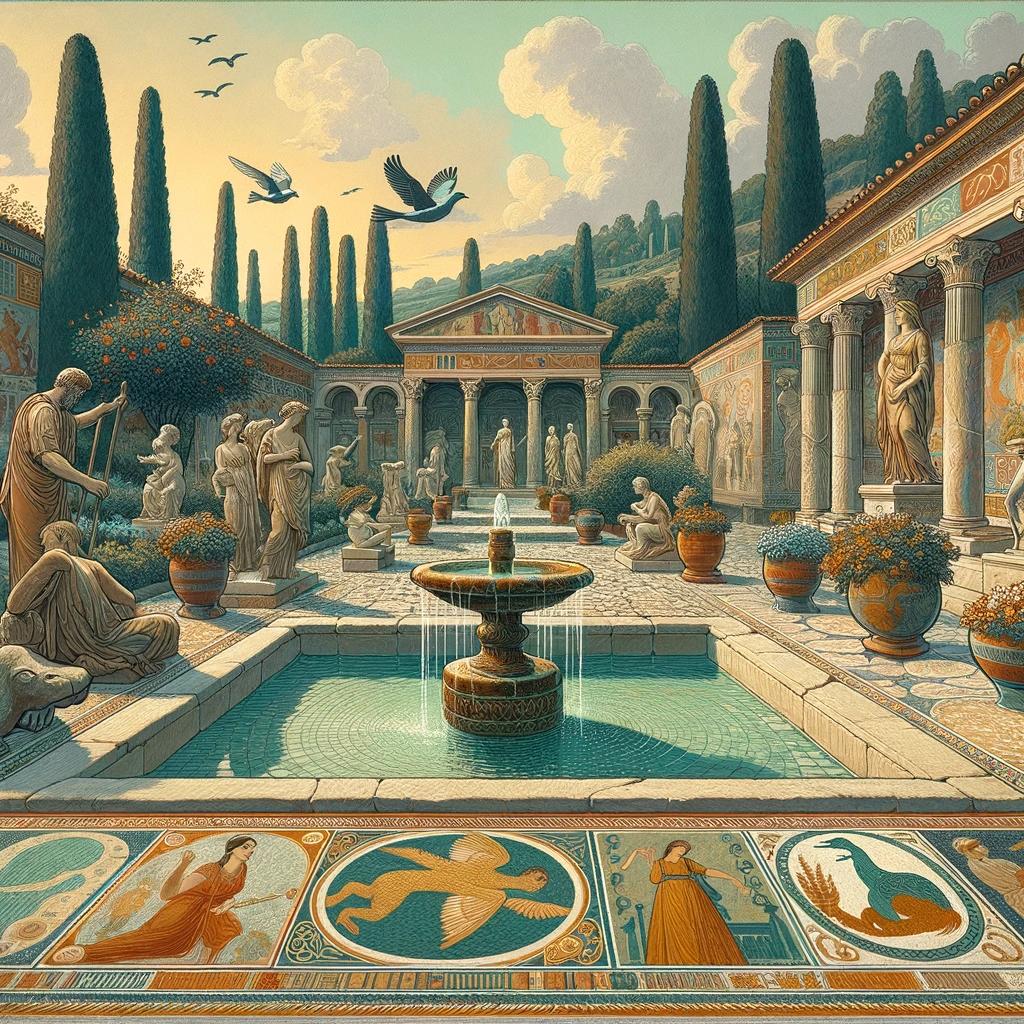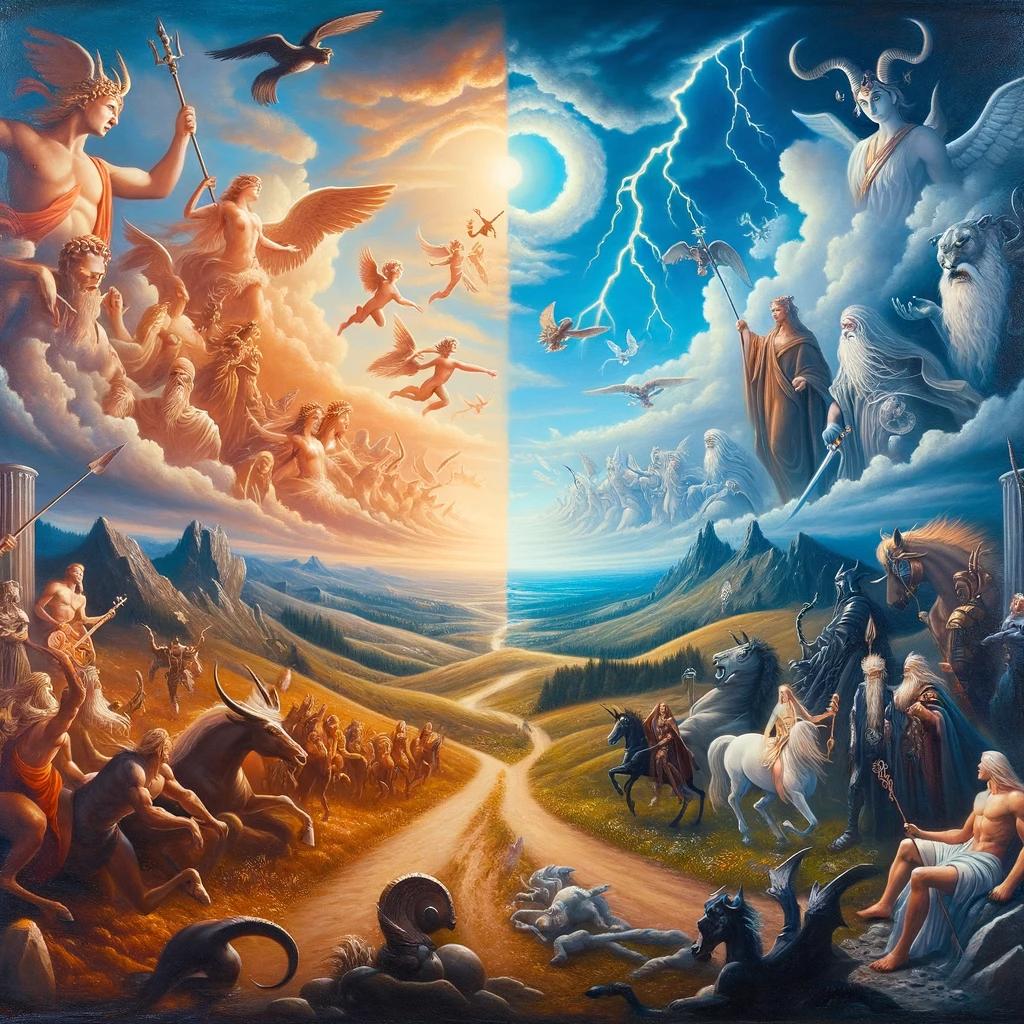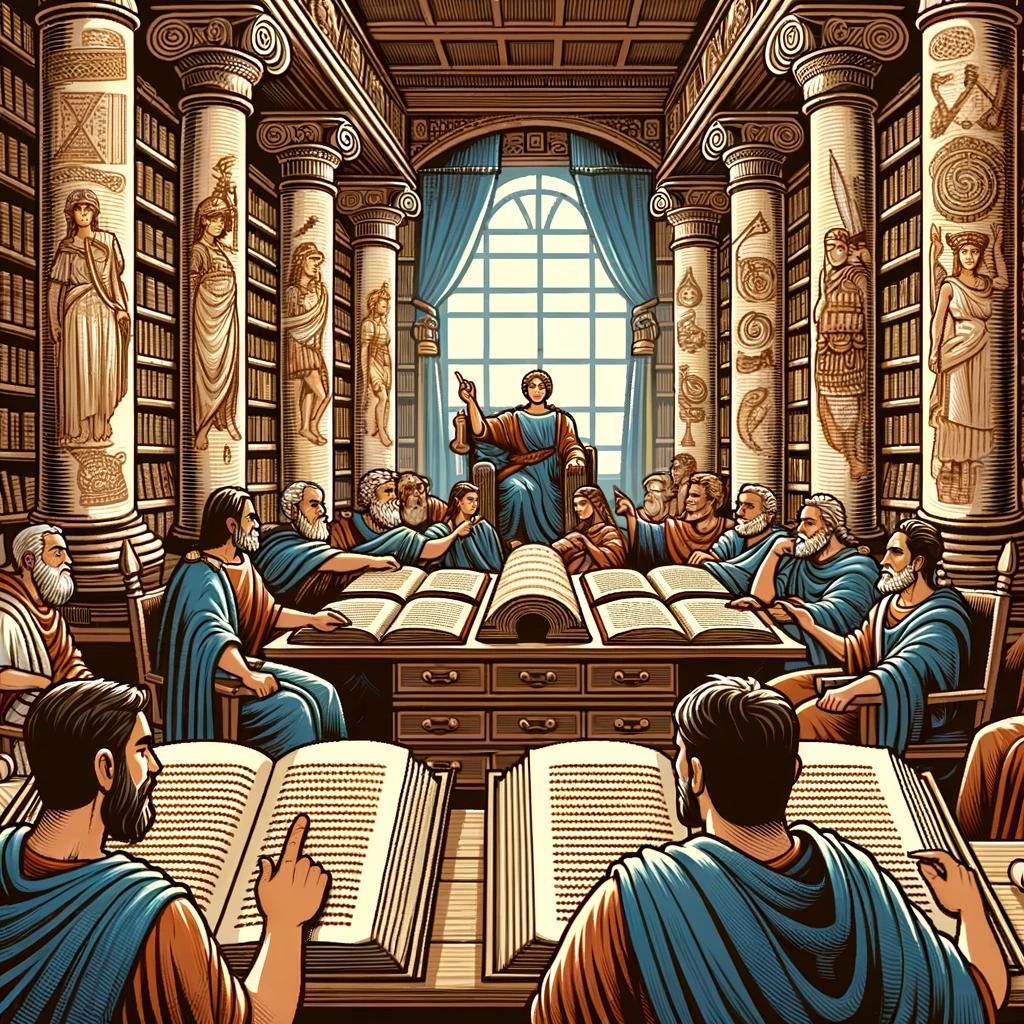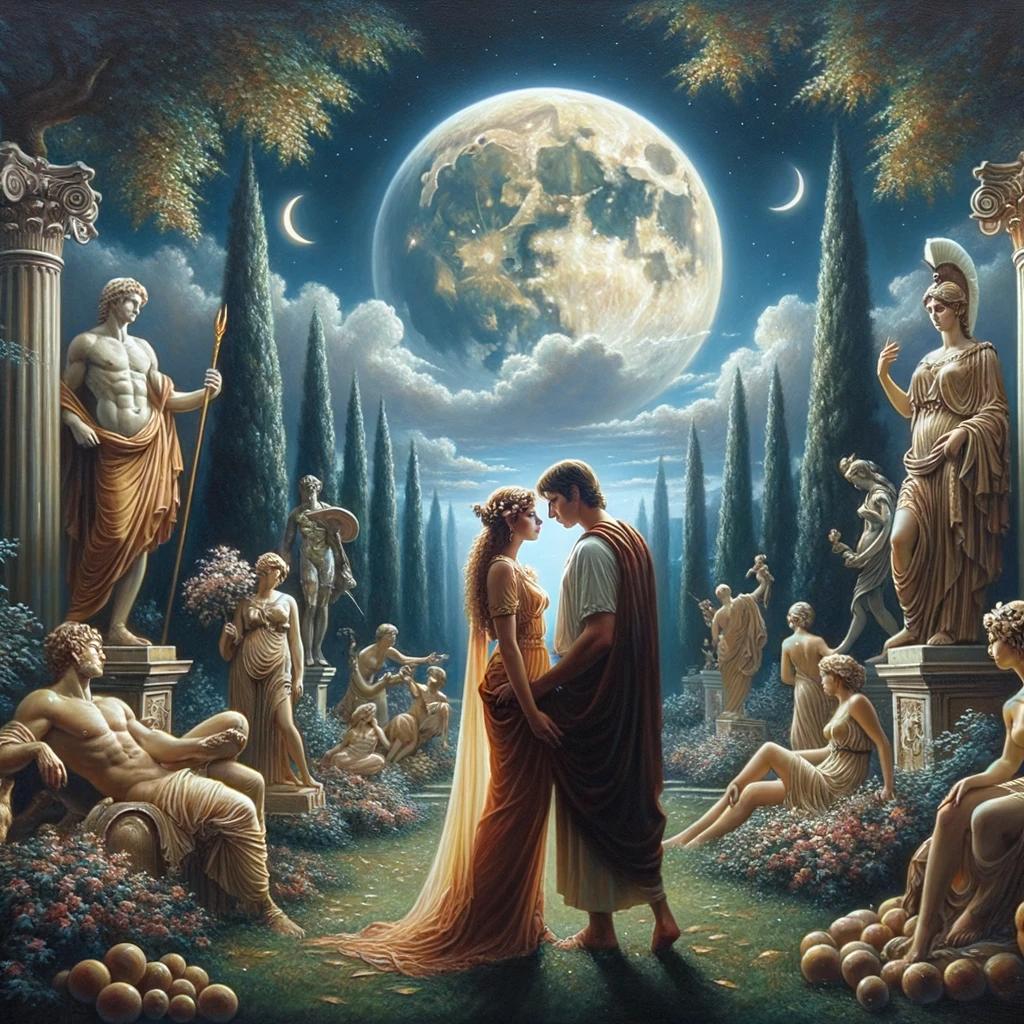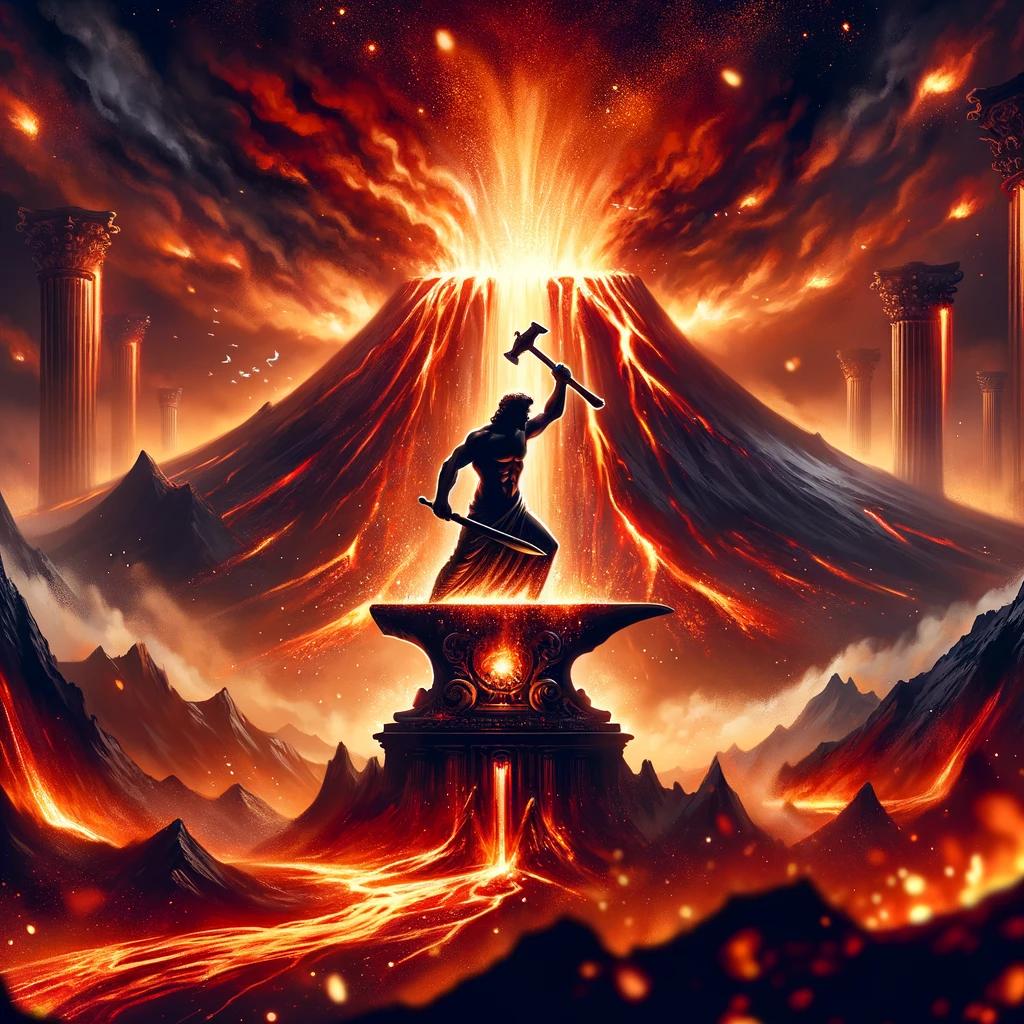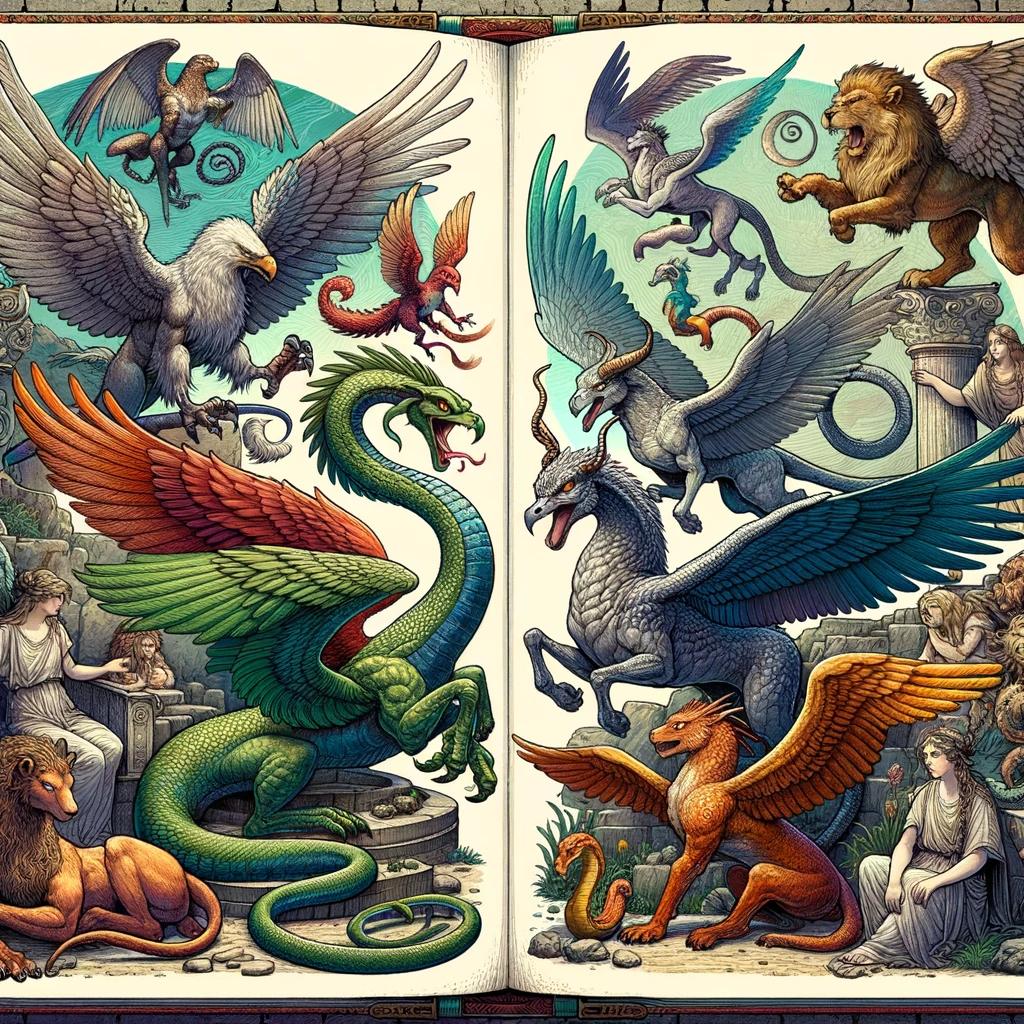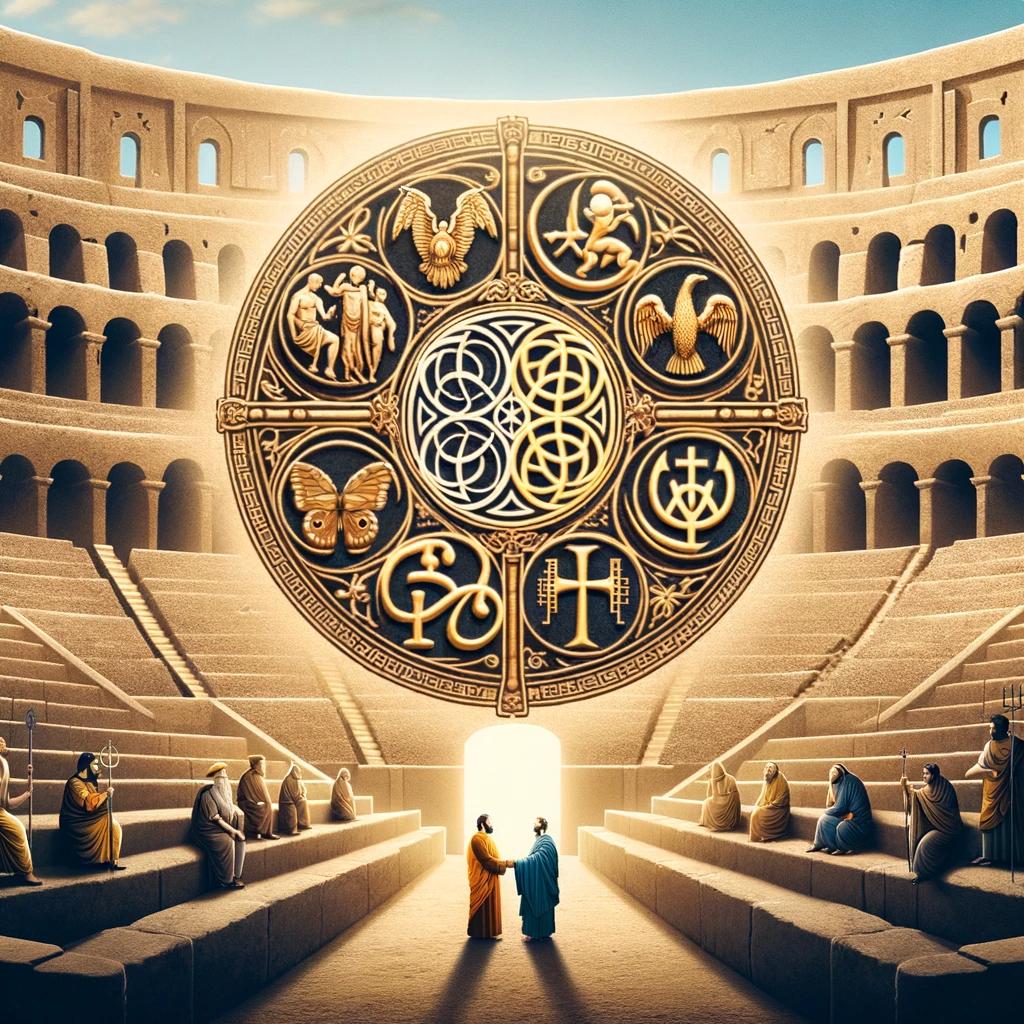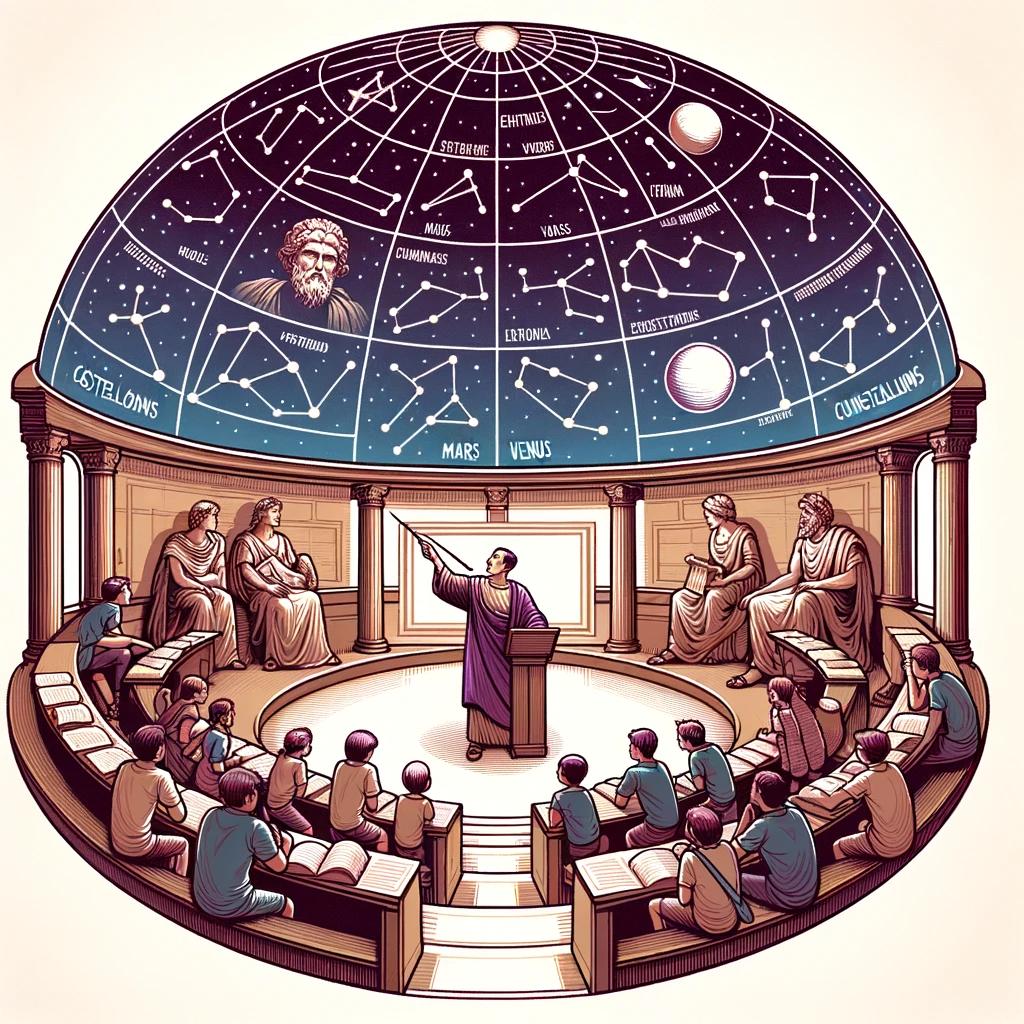Roman Gods and their Greek Counterparts: A Fascinating Exploration of Mythological Deities
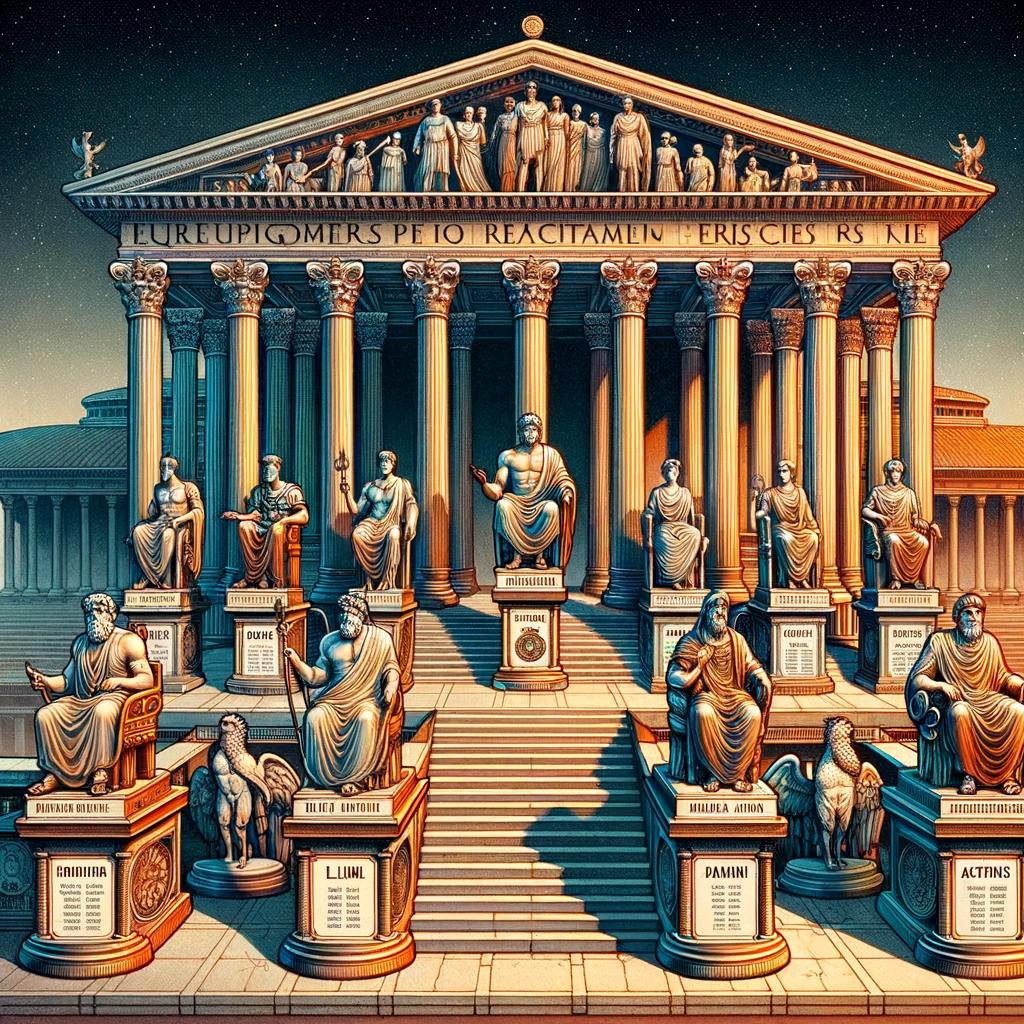
Greek mythology greatly influenced Roman culture, leading to the adoption of many Greek gods by the Romans. This article explores the fascinating parallels between Roman gods and their Greek counterparts.
We delve into the key deities such as Zeus (Jupiter), Poseidon (Neptune), Hades (Pluto), and many more. We also examine the role of Greek mythology in Roman society, its impact on art and literature, and its enduring legacy.
Join us on this journey to discover the captivating connections between these ancient mythologies.
Greek Gods: A Deeper Look
Greek mythology is renowned for its captivating gods and goddesses, each with their own unique powers and stories. Let’s delve into the fascinating world of Greek gods and explore their intriguing characteristics and roles in the pantheon.
Zeus: The King of Gods
Zeus, the mighty ruler of the gods, wields his thunderbolt and presides over the skies. As the father of gods and men, he embodies power, leadership, and authority. We’ll uncover his numerous affairs, his battles against titans and giants, and his pivotal role in the Titanomachy and Gigantomachy.
Poseidon: God of the Sea
Poseidon, the god of the sea, commands the mighty waves and controls the seas. His trident symbolizes his authority and his influence over sailors, fishermen, and the earth-shaking powers of earthquakes.
Join us as we explore his adventures, his role in the creation of horses, and his relation to other sea deities.
Hades: Lord of the Underworld
Hades, the enigmatic lord of the underworld, rules over the realm of the dead. Descending to the depths of the underworld, we’ll uncover the myths surrounding Hades, his abduction of Persephone, and the significance of the River Styx and the judge of the dead, Charon.
Hera: Queen of the Gods
Hera, the majestic queen of the gods and sister-wife to Zeus, possesses unparalleled beauty and divine authority. We’ll explore her tumultuous marriage, her role as the protectress of marriage and childbirth, and the repercussions of her wrath against Zeus’ various love affairs.
Demeter: Goddess of Harvest
Demeter, the goddess of the harvest, ensures the fertility and prosperity of the earth. Discover her connection to agriculture, her grief over the abduction of her daughter Persephone, and the origins of the Eleusinian Mysteries, which promise eternal life after death.
Ares: God of War
Ares, the formidable god of war, revels in the chaos and destruction of battle. Unleashing his wrath on the battlefield, we’ll explore his conflicted personality, his relationships with Aphrodite and Athena, and his role in both Greek and Roman warfare.
Aphrodite: Goddess of Love
Aphrodite, the goddess of love and beauty, captivates mortals and immortals alike with her charm and allure. Join us as we delve into her origins, her affair with Ares, her influence on romantic relationships, and her varied aspects as the goddess of desire, beauty, and fertility.
Athena: Goddess of Wisdom and War
Athena, the wise and valiant goddess of wisdom and war, embodies strategic warfare and enlightened intellect. We’ll explore her birth from Zeus’ head, her patronage of heroes and cities, and her rivalry with other gods and goddesses, including her clash with Poseidon over the city of Athens.
Apollo: God of Sun and Music
Apollo, the radiant god of the sun, music, and prophecy, brings light, harmony, and divine knowledge. Uncover his musical talents, his role as the divine archer and healer, and his domain over the Oracle of Delphi, where his prophecies guided mortals on their fated paths.
Artemis: Goddess of the Hunt
Artemis, the untamed goddess of the hunt and the moon, roams the forests and protects the natural world. We’ll explore her fierce independence, her association with wilderness and wildlife, and her role as the protector of young girls, childbirth, and the moon’s radiant glow.
Hermes: Messenger of the Gods
Hermes, the nimble messenger of the gods, bridges the gap between divine realms and facilitates communication. Discover his cunning nature, his role as the patron of travelers and thieves, and his contributions as the divine herald and psychopomp guiding souls to the afterlife.
Roman Gods: Adaptations of Greek Deities
The ancient Romans were strongly influenced by Greek mythology, and as a result, they adapted many of the Greek gods into their own pantheon. This section will delve into the Roman equivalents of several prominent Greek deities, highlighting the similarities and differences between them.
Jupiter: Equivalent of Zeus
Jupiter, the king of the Roman gods, holds a striking resemblance to Zeus, his Greek counterpart. Both deities embody power, authority, and thunder. Revered as the supreme deity, Jupiter was associated with the sky, lightning, and justice.
Neptune: Equivalent of Poseidon
Roman mythology embraced Neptune as the god of the sea, mirroring the role of Poseidon in Greek mythology. Neptune commanded the waters, ruled over marine life, and held power over storms and earthquakes.
Pluto: Equivalent of Hades
Pluto, the Roman god of the underworld, shares many traits with Hades, his Greek counterpart. Frequently depicted as a stern guardian of the afterlife, Pluto ruled over the realm of the dead and controlled the destiny of souls.
Juno: Equivalent of Hera
Juno, the Roman goddess of marriage and childbirth, matches the attributes and authority of Hera in Greek mythology. Both goddesses were associated with fertility, symbolizing love, family, and protection of women.
Ceres: Equivalent of Demeter
In Roman mythology, Ceres represents the goddess of agriculture, analogous to the Greek deity Demeter. Ceres was venerated as the nurturer of crops, responsible for ensuring abundance and the bountiful harvest.
Mars: Equivalent of Ares
Mars, the Roman god of war, embodies the characteristics of Ares from Greek mythology. Mars was revered as a fierce warrior and personification of military prowess, representing martial strength and strategic warfare.
Venus: Equivalent of Aphrodite
Roman mythos adopted Venus as the goddess of love and beauty, closely resembling Aphrodite. Venus personified desire, romance, and sensuality, captivating mortals and deities alike with her irresistible charm.
Minerva: Equivalent of Athena
Minerva, the Roman goddess of wisdom, bears similarities to her Greek counterpart, Athena. Both goddesses symbolize intellect, strategic warfare, and courage, inspiring artists, scholars, and warriors throughout history.
Vulcan: Equivalent of Hephaestus
Roman mythology incorporated Vulcan as the god of fire and craftsmanship, parallel to the role of Hephaestus in Greek mythology. Vulcan was revered as the master artisan, creating intricate weapons and crafting magnificent works of art.
Mercury: Equivalent of Hermes
Mercury, the Roman god of communication and commerce, shares many traits with the Greek god Hermes. Both deities served as messengers of the gods and patrons of travelers, guiding souls between the realms and facilitating trade.
Greek Gods and Their Roman Counterparts
Explore the fascinating parallels between Greek and Roman deities as we delve into the realm of mythology. From comparing Zeus and Jupiter, the kings of the gods, to uncovering the similarities and differences between Poseidon and Neptune, rulers of the seas, we unravel the intricate connections between these mythological figures.
Comparing Zeus and Jupiter
Discover the striking similarities and slight variations between the mighty Zeus, the supreme deity of Greek mythology, and Jupiter, his Roman counterpart. From their roles as rulers of the gods to their symbolic attributes, we examine the fascinating parallels that reflect the influence of Greek mythology on Roman culture.
Similarities and Differences between Poseidon and Neptune
Delve into the realms of Poseidon and Neptune, gods of the sea, as we explore their shared traits and the nuances that distinguish them. From their powers over water to their significance in both Greek and Roman mythologies, we unravel the connections and discrepancies between these influential deities.
Hades and Pluto: Exploring the Underworld Gods
Take a journey into the depths of the underworld as we examine the intriguing similarities and distinctions between Hades and Pluto. From their realms of the afterlife to their roles in the pantheon, we unravel the complex nature of these gods and the beliefs associated with them in both Greek and Roman cultures.
Juno vs. Hera: Queens of the Gods
Uncover the stories and characteristics of Juno and Hera, the powerful queens of the gods in Roman and Greek mythology. Explore their roles as protectresses of marriage and women, and discover the ways in which their Roman and Greek depictions reflect both shared attributes and distinct cultural influences.
Connecting Demeter and Ceres in Roman Mythology
Delve into the world of agriculture and fertility as we explore the connections between Demeter, the Greek goddess of harvest, and Ceres, her Roman equivalent. Discover the shared themes of abundance and nurturing associated with these deities, and the Roman adaptations that reflect the cultural values and beliefs of ancient Rome.
Ares and Mars: Gods of War in Greek and Roman Culture
Examine the striking parallels and contrasting representations of Ares, the Greek god of war, and Mars, his Roman counterpart. From their associations with military prowess to their influence on warfare and conquest, we unravel the similarities and divergences in how war deities were revered in these two ancient civilizations.
Examining Aphrodite and Venus: Goddesses of Love
Delve into the realm of love and beauty as we explore the divine embodiments of Aphrodite and Venus. Uncover the shared attributes of these goddesses, including their roles in romance and desire, and the ways in which their Greek and Roman identities reflect the cultural ideals of beauty and love in each society.
Athena and Minerva: Goddesses of Wisdom and Warfare
Embark on a journey through the realms of wisdom and warfare as we compare Athena, the Greek goddess of wisdom and strategic warfare, with Minerva, her Roman counterpart. Discover the shared domains of knowledge and battle strategy that these goddesses presided over, and the cultural nuances that influenced their portrayal in Greek and Roman mythologies.
Greek Gods and Goddesses in Ancient Rome
Role of Greek Deities in Roman Society
Greek mythology exerted substantial influence on every aspect of Roman society, including religion, politics, and culture. The Romans recognized the power and significance of Greek gods and goddesses and incorporated them into their belief system.
Greek deities were worshipped alongside traditional Roman gods, and their presence brought new meaning and rituals to religious practices. The Romans believed that honoring these Greek deities would ensure their favor and protection.
Temples and Worship of Greek Gods in Rome
In ancient Rome, magnificent temples were built to honor Greek gods and goddesses, providing sacred spaces for devotees to worship and make offerings. These temples were rich in architectural grandeur and adorned with intricate sculptures and artwork, symbolizing the divine presence.
Religious festivals and ceremonies were held regularly to celebrate the Greek deities, attracting large crowds of worshippers who sought blessings and divine intervention.
Influence of Greek Mythology on Roman Art and Literature
The artistic and literary world of ancient Rome was greatly influenced by Greek mythology.
Roman poets, playwrights, and artists drew inspiration from Greek myths, incorporating their themes, characters, and stories into their works. Greek deities were often depicted in Roman art, sculptures, and mosaics, capturing the imagination of the people and showcasing the enduring fascination with Greek mythology.
These artistic representations served as a visual link between the cultures, perpetuating the tales of gods and goddesses for generations to come.
- Mythological scenes and characters adorned murals in Roman villas, providing a glimpse into the heroic exploits and divine narratives of Greek deities.
- Statues of Greek gods and goddesses were commissioned by wealthy Romans, both as religious symbols and as a display of wealth and cultural refinement.
- Epics and poems, such as Ovid’s “Metamorphoses,” retold Greek myths in a Roman context, ensuring the continued popularity and dissemination of these timeless tales.
- Greek myths and legends served as inspiration for Roman theater productions, captivating audiences with stories of love, betrayal, and adventure.
The intermingling of Greek and Roman cultures enriched the tapestry of ancient Rome, shaping its religious practices, architectural design, and artistic expression.
Greek gods and goddesses found a cherished place within Roman society, leaving an indelible mark on the cultural identity of the empire.
Legends and Myths in Greek and Roman Cultures
Welcome to the captivating world of Greek and Roman legends and myths! In this section, we will delve into some of the most renowned and fascinating stories that have been passed down through the ages.
From epic conflicts to heroic feats, join us as we explore the rich mythical heritage of these ancient cultures.
The Trojan War: Epic Conflict and its Heroes
The tale of the Trojan War is one of the most famous and enduring stories from Greek mythology. It chronicles the conflict between the Greeks and Trojans, sparked by the abduction of Helen, the wife of Menelaus.
The war lasted for ten long years and saw the involvement of legendary heroes such as Achilles, the invincible warrior, and Odysseus, the cunning strategist. We will unravel the intricacies of this epic battle and the heroes who left an indelible mark on Greek and Roman mythology.
Adventures of Apollo: From Birth to Godhood
Apollo, the god of the sun, music, and prophecy, is a prominent figure in both Greek and Roman mythology. His journey unfolds with the story of his tumultuous birth and his pursuit of divine greatness.
We will follow Apollo’s adventures, from his slaying of the fearsome Python to his establishment of the Oracle of Delphi, and explore the complex nature of this multifaceted deity.
Perseus and Medusa: Heroic Feats and Divine Aid
The legendary hero Perseus is renowned for his bravery and resourcefulness in battling the monstrous Gorgon Medusa. Armed with a reflection-shield and winged sandals, he embarks on a perilous quest to slay Medusa and save his mother from a dreadful fate.
We will delve into the myth of Perseus, examining the divine aid he receives from gods such as Hermes and Athena, and uncover the symbolism behind this iconic tale.
Amazons, Centaurs, and Other Mythical Creatures
The world of Greek and Roman mythology is populated by a fascinating array of mythical creatures. From the fierce and powerful Amazons to the enigmatic and half-human half-horse Centaurs, these creatures play significant roles in various legends and tales.
We will explore the origins and characteristics of these mythical beings, uncovering the symbolism and meaning behind their inclusion in ancient stories.
Immerse yourself in the enchanting tales of Greek and Roman cultures, where gods intermingle with mortals, heroes rise to great heights, and mythical creatures awe and terrify.
Join us as we uncover the legends and myths that have shaped the imagination and cultural legacy of these ancient civilizations.
Modern Influence and Popularity of Greek and Roman Mythology
Greek and Roman Mythology in Contemporary Media
Greek and Roman mythology continues to captivate modern audiences through various forms of media. From blockbuster movies like “Clash of the Titans” to popular TV series like “American Gods,” the ancient gods and heroes are reimagined in exciting and engaging ways.
Video games such as “God of War” and “Assassin’s Creed Odyssey” draw inspiration from these mythologies, offering players immersive adventures in ancient worlds. Additionally, books, graphic novels, and even online content showcase the enduring popularity of these ancient tales, making Greek and Roman mythological characters household names once again.
Lessons and Themes from Ancient Myths
Beyond their entertainment value, Greek and Roman myths continue to hold important lessons and themes that resonate with modern-day society. The stories of heroism, love, betrayal, and redemption provide timeless insights into the human condition.
They explore concepts of power, justice, and morality, raising thought-provoking questions about the nature of existence and the choices we make. These ancient narratives are continually interpreted and analyzed by scholars, philosophers, and individuals seeking wisdom and inspiration, highlighting the enduring relevance of Greek and Roman mythological tales in shaping our understanding of the world around us.
Greek and Roman Mythology in Contemporary Media
– Blockbuster movies like “Clash of the Titans” and “Percy Jackson” series bring the mythological characters to life on the big screen.
– Popular TV shows like “American Gods” and “Olympus” explore the clash between ancient gods and modern society.
– Video games like “God of War” and “Assassin’s Creed Odyssey” provide immersive experiences in mythological settings.
– Books, graphic novels, and online content continue to reimagine and reinterpret these ancient tales for modern audiences.
Lessons and Themes from Ancient Myths
– Greek and Roman myths offer timeless lessons about heroism, love, betrayal, and redemption.
– These stories explore complex themes of power, justice, and morality.
– Philosophers and scholars analyze these narratives to gain insights into human nature and the choices we face.
– The enduring popularity of these ancient tales attests to their ability to inspire and provoke contemplation even in the modern world.
Exploring the Eternal Legacy of Greek and Roman Gods
The timeless allure of Greek and Roman mythology has left an indelible mark on our collective imagination.
The gods and goddesses of these ancient civilizations continue to captivate us with their tales of power, intrigue, and divine intervention.
- These mythological figures have transcended time and culture, their stories passed down through generations.
- From Zeus and Jupiter’s thunderbolts to Poseidon and Neptune’s dominion over the sea, these gods hold sway over natural forces and human affairs alike.
- The eternal darkness of the Underworld, ruled by both Hades and Pluto, evokes fascination and fear.
- Juno and Hera, the queenly counterparts, have navigated tempestuous relationships with their divine consorts.
- Demeter and Ceres have been revered as the bringers of fertility and abundance.
- Ares and Mars, fierce gods of war, embody both the destructive and strategic aspects of conflict.
- Aphrodite and Venus reign as goddesses of love, their enchanting beauty capturing hearts throughout the ages.
- Athena and Minerva, wise and formidable, embody both intellect and martial prowess.
- Hermes and Mercury bring messages from the divine, serving as intermediaries between gods and mortals.
These powerful deities and their enthralling stories have found expression in various art forms, literature, and religious practices.
They have inspired the grandeur of ancient temples, the brushstrokes of celebrated artists, and the verses of renowned poets.
- The vibrant sculptures and paintings in tribute to these gods speak to their enduring impact on aesthetics and artistic expression.
- The works of ancient writers and poets like Homer and Ovid have immortalized their legends, ensuring their legacy survives the passage of time.
- The Romans’ adoption of Greek mythology not only reinforced their cultural ties but also allowed for the reinterpretation and assimilation of these captivating tales.
The evergreen tales of heroes and gods from both pantheons continue to resonate in contemporary society.
Their stories have been reimagined and retold, adapted into movies, novels, and even video games, keeping their immortal spirits alive.
- The mythic tales of the Trojan War, the adventures of Apollo, and the heroic feats of Perseus and Medusa remain as popular and enthralling as ever.
- These ancient civilizations’ imaginative portrayal of creatures like centaurs, sirens, and the mighty Minotaur continue to stir the imagination and fuel creative endeavors.
The lasting legacy of Greek and Roman gods can also be seen in the echoes of their philosophies and values in contemporary society.
- Ideas of justice, wisdom, cunning, and honor, as embodied by Athena, Zeus, and other deities, continue to shape our moral compass.
- Exploring these mythological tales offers us a deeper insight into the complexities of human nature.
As we delve into the eternal legacy of Greek and Roman gods, their influence remains palpable in our art, literature, and the very fabric of our cultural heritage.
These ancient deities continue to inspire, educate, and enchant us, reminding us of our shared fascination with the divine.
.

